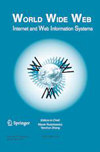We have witnessed the emergence of a new revolution: 'The Web Revolution'. This worldwide revolution has resulted in the globalization of information access and publishing. World wide web researchers and practitioners face new technical challenges in advancing the world wide web technology from the globalization of access to the globalization of computing. World Wide Web (WWW) is an international archival peer-reviewed journal which covers all aspects of the world wide web (www). Appearing quarterly WWW publishes research results innovative case studies actual project experiences state-of-the-art surveys and tutorials. Papers published in WWW deal with subjects directly or indirectly related to the world wide web. WWW provides timely in-depth coverage of most recent developments in the www discipline to enable anyone involved to keep up-to-date with this dynamically changing technology. WWW topical coverage includes but is not restricted to the following subjects as they relate to the www: Application program interfaces; Authoring tools and environments; Browsing and navigation techniques and tools; Charging and payment; Collaborative learning and work; Computer-based training and teaching; Content languages (e.g. HTML Java VRML); Courseware development; Data and link management; Database publishing; Design principles and techniques; Digital libraries; Distance education; Distributed computing; Electronic commerce; Financial transactions; Firewalls; Information storage and retrieval; Innovative applications; Integration of heterogeneous information sources; Metrics and measurement; Multimedia software engineering; Object-oriented software engineering; Performance evaluation; Protocols (e.g. HTTP IIOP); Real-time computing; Search techniques and engines; Security authorization authentication and privacy; Server and client technologies; Universal design (.e.g. multilingual access); User interfaces; Verification validation and testing; Virtual reality and 3D visualization; Web page design techniques and tools; Web site management techniques and tools; www-based training and teaching; www-based multimedia/hypermedia systems; www-supported cooperative work.
